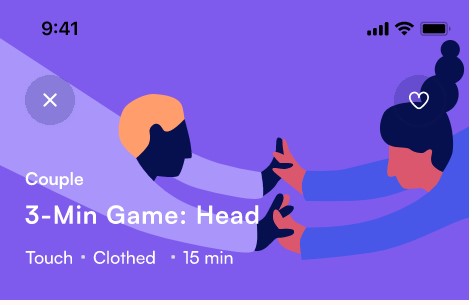“Who would you describe as the initiator of sex in the relationship?”
A. Me
B. Parter
C. Equal
D. Not sure
This was one of the assessment questions for the sex therapy app I just signed up for: Blueheart. I was told I would be given a personalized plan from the answers, so I really wanted to answer as thoroughly and honestly as possible.
Take the assessment & get your own personalized plan—here >>
As someone who always wants to get things “right,” it’s safe to say I was more than a little uneasy about having all my possible flaws as a sexual partner uncovered. But, at the same time, I was also excited to see how my relationship could grow in the intimacy department.
During my time here at Elephant, I’ve been lucky enough to have tried a multitude of sex toys and serums and sensual “helpers,” but I was really looking for expert advice. I needed something that touched on matters of the heart/mind and guided the sexy side and could be done in the privacy of my own home. (A girl’s got needs, okay?!) Basically, Blueheart fell into my lap when I needed it most.
Oh, and by the way, my answer was B. And I felt so.dang.guilty. Before I could even start digging into the learning and healing part, I was already spiraling. There was shame for not showing up. Embarrassment for wanting to change my answer to C. And then there was pain—because I think I knew I’d been withdrawing.
They soon reassured me that this was my subconscious’ way of creating and perpetuating a “pursue-retreat” cycle between my husband and me. Basically, one person attempts to initiate sex while the other might say something like, “I’m too tired” or “maybe later.” After a while, it leaves one person feeling guilty or anxious, the other a little frustrated, and both feeling totally stuck.
As much as I wanted to beat myself up for being the retreat-er, I knew that would only keep the cycle going. It kinda came down to this: like most things, half the battle is showing up—not sticking our heads in the sand.
The other half? Well, that’s what Blueheart is for: to help us break through sexual difficulties and tear down sexual taboos—in a safe, private, nurturing setting.

Finding your way back to each other
I always knew that the honeymoon period of “sex anywhere, anytime” would fizzle out at some point, but I wasn’t ready to resign our bedroom life to the too-easily accepted “this is just what happens when you’re married” phase.
Even though I was slightly comforted to know that “up to 80% of couples regularly experience situations where one partner wants to have sex and the other doesn’t,”(1) I knew it was time to shake things up. I didn’t want to get complacent or continue retreating from something that hurts my husband or me. So, I was open to any and all guidance from Blueheart’s in-house therapists.
A FREE 2-week trial of Blueheart (+ 50% off your subscription) is right this way >>
Here’s what it looks like:
Throughout the week, there’s a mixture of short “exercises” broken up into three genres, which serve as the pillars of their mission as well:
>> Learn
>> Talk
>> Touch
Don’t worry; I’ll explain more about this trifecta later.
Before beginning a session, they let us know the location we’d want to be in before starting, clothed/not clothed, and whether the session can be done solo or together. For me, this was super comforting because initially, I was like “am I going to have to shave before sex therapy? What if I’m not ready for some sex-capade in the middle of my work week?”

Ahh, okay. I can relax now. There’re no surprises. So, if it already feels like our libido is impossible to find (just like all our missing socks), it’s nice to take all that pressure off.
Deepening the Sexual Connection
Whether it’s the fact that looking in the mirror makes us sick, or we’re busy, or we get in our heads too much, or we’re depressed, or we have physical pain—or any other thing that hits the brakes on sexual connection—navigating intimacy issues can feel like floating in space with no spacesuit. And, of course, it’s even harder when we know we love our person but the physical spark is just not lighting up like it used to.
Sometimes, life is happening so quickly we don’t recognize the sexual rift being created. Or, maybe the flame has been getting snuffed out for a while and we have been struggling with where to start. Or how to say it. Or simply feeling dejected because “orgasms feel like a far-off fantasy at this point.”
There are a million reasons why we end up on different sides of the sex track with our partners, but it doesn’t mean we can’t come back together and end up in the same place—feeling heard, sexually satisfied, and more connected than ever. Driven by science and mindfulness, the sex gurus of Blueheart have our back on the “how” part.
In fact, in an efficacy study conducted by Principal Researcher Dr. Laura Vowels, after just 2 weeks with Blueheart, couples reported on average:
- 105% more satisfaction with the amount of physical intimacy between them
- 72% more physical connection
- 70% more satisfaction with the amount of touch between them
Learn. Talk. Touch. Your path back to intimacy starts here >>
“What if I struggle to even “get there”—let alone orgasm?”
Well, it’s important to note that difficulty orgasming (anorgasmia) is more common than we think—though, it doesn’t make it any easier if we or our partner are struggling with it. Male, female, gender non-binary…it makes no difference—being unable to climax can lead to feelings of inadequacy that can impact confidence and damage relationships.
Let’s dig a little deeper here: orgasms can be the cherry on top of sexual experiences, but there’s a lot more on the table with respect to relationships. Plainly: improving orgasm for both partners is about more than the physical aspects of sex…it’s about building an emotional connection too. Psst! Remember how I mentioned the three different types of Blueheart sessions? Here’s how they come into play (wink)…

Enhancing Intimacy with Blueheart
For many, the struggle with orgasm isn’t solely a physical struggle; the mental-emotional stuff gets in the way, too. And that’s why Blueheart’s sessions have different “types”—to cover all the intersections.
The 3 types of Blueheart sessions:
1. Learn
These sessions can be audio-guided or read. They encourage us to: learn about our partner’s body. Learn to talk about sex. Then talk about how we can stimulate each other in a way that feels good. If either partner isn’t sure, they also help us learn how to communicate better in the “talk” section.
In terms of orgasm struggles, here’s a small example: I work from home, so I’m often in what I call a “hobo uniform.” If I don’t give myself time to spruce up in some way, shape, or form, I just won’t orgasm. Period. And it has nothing to do with my husband’s…capabilities.
2. Talk
For some of us, the “getting your partner involved” part can be daunting. “Hey, babe, let’s get coffee and talk about the dead bedroom in our lives.” Yikes.
Well, it makes sense. When it comes to therapy (particularly sex therapy), the fear, anxiety, and awkwardness that’s already present in a “normal” difficult conversation become heightened. We don’t want to hurt our partner’s feelings or start a fight, and sometimes we downright don’t have the words to express what’s going on. That, my friends, is the reason we come to therapy in the first place. And Blueheart has the tools to help us out.
Take the stress out of sex—with Blueheart >>
On my end, I started doing sessions on my own because I was feelin’ a bit sheepish. But when I told my husband about it, he said (in his own words), “Uhh, yeah! What are we waiting for?! Let’s touch each other!”
3. Touch
The touch sessions use the Sensate Focus technique. It’s a series of touch exercises that are designed to take the pressure away, reduce sexual anxiety, and help us explore our own and our partner’s bodies—at our own pace and in our own time.
Our first session was called the “3-Minute Game: Hands.” We focused solely on, you guessed it, touching each other’s hands. It was four rounds of the three-minute games: one person is the “giver” and one is the “receiver,” and we swapped each round. Before we’d begin, we’d talk about how we’d like our hands to be touched. As the receiver, we would focus on different sensations: temperature, pressure, texture.
Giggling uncomfortably like middle-schoolers hitting puberty, it took us a few rounds to really relax into the intention behind the exercise. But once we did, there was no laughing. Everything was electric and heightened. I could feel…him. Like our bodies were talking to each other—vibrating, almost.

For me, it gave a whole new meaning to “connection,” and because there was no pressure to make it sexual, we were both fully present and aware of each other—still wanting to make it “feel good,” but there was no rush. Each brush of the hand or interlacing of the fingers meant so much more.
Looking to rekindle the connection in your relationship? Blueheart is here to help >>
From there, we moved on to different sections of the body, and each time we were asked how comfortable we felt and rated our ability to stay present during the session. These check-ins are key because, in their own words, “Our method helps arousal increase naturally. The goal is not to orgasm, or even to engage in sexual intercourse until you’re both ready.”
Getting closer—one session at a time
I know it hasn’t been long, but for us, it has been an awakening—a rediscovering of ourselves and each other.
As I went through the sessions solo, I discovered how to discuss the hot topic burning a hole in our household lately: scheduling sex. The disconnect was the taboo of “scheduling” (that it kills the “sexy” part of sex) and my lack of energy (followed by guilt) for sex during the week.
As a couple, the “learn” session gave us sexual and emotional insights we’d been missing; the “talk” sessions helped us to communicate without an onslaught of emotions or damaging words. And the “touch” opened us up to a whole new world of sensation. It helped us to slow down—really savor every inch of one another.
I’d say the short and easy-to-digest sessions are what hooked us. But, it was the evolution from “sex problems = cringe” to the rekindled sense of sexual curiosity and closeness that’s keeping us on the line.
While sex immediately after dinner will probably never be on the menu, I’m excited about our future of open dialogue. Our desires and sex drive may vary, but we’re learning, talking, touching, and figuring it out…together.
~



Read 5 comments and reply